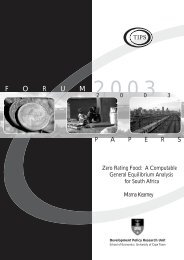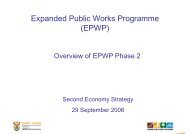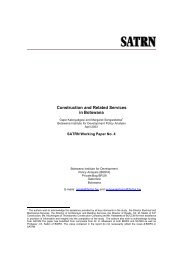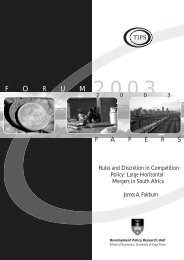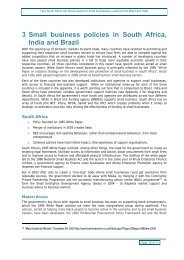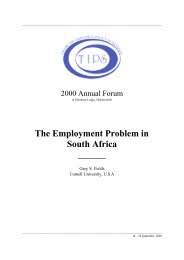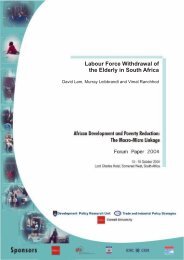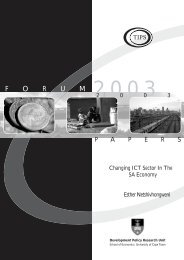(AsgiSA) Annual Report 2008 - South African Government Information
(AsgiSA) Annual Report 2008 - South African Government Information
(AsgiSA) Annual Report 2008 - South African Government Information
You also want an ePaper? Increase the reach of your titles
YUMPU automatically turns print PDFs into web optimized ePapers that Google loves.
Accelerated and Shared Growth Initiative for <strong>South</strong> Africa<br />
ANNUAL REPORT<br />
<strong>2008</strong><br />
3.3.1 While the main target is to end poverty, inequality matters as an issue for the following<br />
key reasons:<br />
• In <strong>South</strong> Africa, structural inequality plays a key role in sustaining diverse forms of economic<br />
marginalisation and limits the potential for growth and employment creation.<br />
• Evidence suggests that highly unequal societies tend to grow more slowly, and that the<br />
effects of such growth tend not to be pro-poor. (World Development <strong>Report</strong>, 2006). Addressing<br />
inequality is therefore a necessary part of a strategy to achieve shared growth.<br />
• In <strong>South</strong> Africa, the levels of growth required to impact significantly on poverty within current<br />
patterns of distribution are probably unattainable; shifts in the patterns of distribution<br />
are therefore a necessary part of an anti-poverty strategy.<br />
• High levels of inequality can cause social conflict. This is undesirable on its own terms, but<br />
it has economic as well as social costs.<br />
3.3.2 The structure of the <strong>South</strong> <strong>African</strong> economy constrains employment creation in the<br />
core economy as well as in more marginal contexts<br />
In the core economy: The <strong>South</strong> <strong>African</strong> economy is highly centralised, capital-intensive and<br />
dominated by a set of monopoly industries. Capital-intensive industries tend to exclude<br />
small and medium-sized enterprise (SME) participation and make employment creation expensive.<br />
While the focus of policy has been to try to address this within the core economy,<br />
through the introduction of effective competition policy, for example, such policies should<br />
also be seen as part of the Second-Economy Strategy – because of the ways in which the<br />
structure of the economy also impacts on the scope for enterprise development and employment<br />
creation in more marginal contexts.<br />
On the margins: In many developing countries, the informal sector provides easy access to<br />
livelihood opportunities for those unable to find formal employment. <strong>South</strong> Africa’s relatively<br />
small SME sector is often attributed to factors such as lack of skills and entrepreneurship or<br />
access to credit. Important as these are, this tends to overlook the way the structure of the<br />
economy constrains the scope for growth in this sector, for the following reasons:<br />
• The scope for small manufacturing enterprises targeting poor consumers is small because<br />
most manufactured consumer goods bought by poor people are already mass-produced<br />
in the core economy and are available even in remote areas.<br />
• Access to opportunities beyond the local economy, in higher volume and/or higher-value<br />
markets tends to require greater levels of formality. While this is where the most scope<br />
for SME development and job creation exists, there are higher barriers to entry in these<br />
markets.<br />
• While there is some scope in relation to fresh produce and services, these also tend to be<br />
relatively small in scale, unless they’re part of more formal value chains.<br />
• The scope for small artisan-based enterprises is limited by the skills challenge and the<br />
high demand for such skills in the formal sector.<br />
As a result, <strong>South</strong> Africa’s informal and/or micro-enterprise sector is unusually dominated by<br />
retail activity, often in a dependent relationship to the core economy. There are limits to the<br />
scope for this sector to expand, or for street traders or spazas to climb a ”ladder” into more<br />
formal enterprise: that space is taken, with ”big retail” also increasingly encroaching into<br />
markets currently served by this sector.<br />
12



